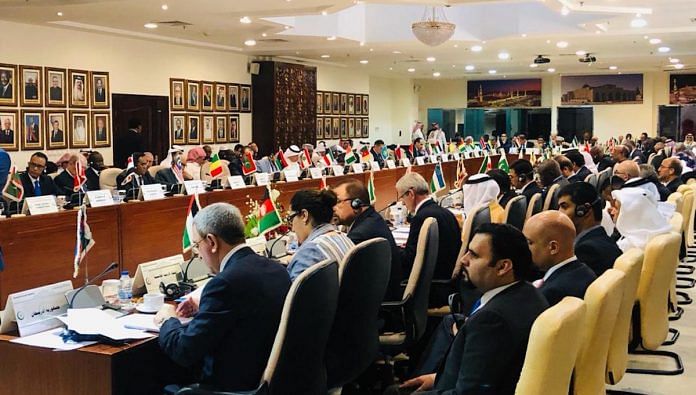New Delhi: The UAE’s invitation to India as “guest of honour” at this year’s Organisation of Islamic Cooperation (OIC) summit is a watershed moment for New Delhi’s foreign policy.
Since the OIC’s inception in 1969 as a platform of cooperation for countries with a significant share of Muslim citizens, India has had a rather uncomfortable relationship with the organisation on account of its tense ties with Pakistan.
During the inaugural OIC Summit in 1969 at Rabat, Morocco, India faced severe embarrassment when it was officially invited to attend but subsequently asked to leave on then Pakistan president Yahya Khan’s insistence.
ThePrint revisits the 1969 episode and then tracks how India’s relationship with OIC has evolved over the past five decades.
Also read: Pakistan foreign minister threatens to boycott OIC meeting where Sushma invited as guest of honour
What is Organisation of Islamic Cooperation?
In the aftermath of the arson attack on Al-Aqsa mosque in Jerusalem in August 1969, which was reportedly carried out by a Zionist, Saudi Arabia took the initiative to foster pan-Islamic solidarity. This initiative culminated in the creation of the OIC.
Those seeking membership had to fulfill one of two conditions: Either have a Muslim-majority population or have a Muslim head of state. On a strategic level, the OIC symbolised a shift of the balance of power in west Asia from Egypt to Saudi Arabia.
OIC met for the first time in September 1969 at Rabat. In an account published in The Wire and sourced from the Indian Foreign Affairs Journal, the then Indian ambassador to Morocco, Gurbachan Singh, recounted India’s experience at the maiden OIC conference.
On the second day of the summit, Singh said, the foreign minister of Morocco summoned him to convey that the OIC had “unanimously decided to invite the Government of India to send an official delegation to the conference”.
When Singh asked whether Pakistan was part of that consensus, the minister, he said, assured him that it was.
As it would take a day for the official Indian delegation to reach Morocco, an ad hoc three-member delegation headed by Singh participated in the evening session on Day One. According to Singh, Khan was also present at that session and had exchanged pleasantries with him.
The official Indian delegation, headed by former President Fakhruddin Ali Ahmed (he wasn’t President at the time, but a Lok Sabha member), reached Rabat the next day. However, upon his arrival, Ali was told that India could not attend the meeting as Khan had threatened to stay put in his villa unless New Delhi was disallowed from attending the inaugural OIC.
He had cited the 1969 Gujarat riots, in which several Muslims had died, to argue that India had no place at the OIC. Leaders of various countries are said to have tried to convince Khan, but in vain.
According to Singh, they offered Ali two options: Either the Indian delegation accepts a change in status from ‘member’ to ‘observer’, or voluntarily abstains from attending the concluding session.
The Indian delegation refused both offers and was eventually not allowed to participate, though the embarrassment did not end here. The preamble to the declaration referred to the Indian delegation as being that of “the Muslim community of India”.
Furthermore, according to Singh, King Hassan of Morocco, in his concluding speech, “invoked the blessing of God on all and his protection to the Muslims in Palestine and India and wherever they were suffering”.
This entire episode was regarded as a major diplomatic embarrassment in Delhi.
Evolution in India-OIC relationship
Through the 1990s, the OIC became a major irritant for successive Indian governments. Year after year, it would release resolutions condemning India’s actions in Kashmir, with the censure intensifying after the destruction of the Babri masjid in 1992.
Former diplomat Talmiz Ahmed, who has served as India’s ambassador to Saudi Arabia, explained why in a column for The Asian Age: The OIC had no real significance, he said, except when Saudi Arabia needed ‘Islamic backing’ for its policies and got a resolution passed by OIC. In turn, it allowed other members to pass resolutions against whichever state they wanted, Ahmed wrote.
Through the 1990s, India provided lengthy rebuttals to the OIC’s resolutions on Kashmir, until early 2000, when then external affairs minister Jaswant Singh decided that New Delhi would only provide a short statement on OIC resolutions, as noted by Ahmed in his column in The Asian Age.
Since then, India’s relationship with the Gulf states has drastically improved. At the past two meetings, the OIC resolutions had no reference to Kashmir.
External Affairs Minister Sushma Swaraj will address the OIC Friday, 1 March.
Also read: At OIC meet today, Sushma Swaraj to focus on India’s fight against terror




This is a major diplomatic success of Modi Govt. but the fake liberals in India can’t digest it.